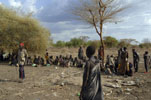
A feature story today by Skye Wheeler of Reuters effectively captures the nuance of the violence plaguing southern Sudan, which has led to more than 1,200 deaths since the start of the year. (Other sources estimate that this figure may be even higher.)
In particular, the article notes that blame for the violence is perhaps less clear cut than earlier reports indicated. From Reuterst:
Khartoum may get a lot of the blame, but it is not the only potential culprit, says John Ashworth, in a recent study for campaign group Pax Christi.
"Not all the culprits can be traced to Khartoum, and some may have links to SPLM," he wrote.
"Southern politicians and former militia leaders are perceived as being involved, using local ethnic tensions for their own ends. When asked who is behind the trouble, local people often answer, ‘The politicians. The intellectuals. People from the town.’"
There have already been signs of splits within the SPLM, as leading figures try to strengthen their fiefdoms ahead of national elections, scheduled for April 2010.
The article also indicates a grassroots element to the fighting.
Cattle rustling is still playing a large part in the violence. Some of this year’s attacks have been launched in revenge for earlier cattle thefts.
Those traditional flashpoints have become more dangerous with the ready supply of weapons, left over from the civil war and other conflicts, and bored jobless youth, disaffected by the lack of development in the south since the peace deal.
The story highlights a crucial point: In addition to the tragic loss of life, the violence in southern Sudan will severely hamper efforts to implement the key provisions of the Comprehensive Peace Agreement, namely national elections scheduled for next April and a referendum on southern secession in 2011. It is shocking how little international attention Sudan receives even as its landmark peace deal looks headed for collapse.

